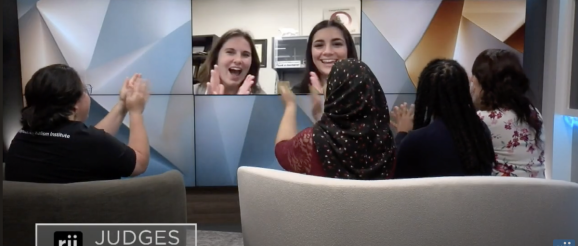Journalism Innovation Lab team finishes third in national innovation competition – Grady

Journalism Innovation Lab team finishes third in national innovation competition Journalism Innovation Lab team finishes third in national innovation competition The Journalism Innovation Lab’s second student innovation team, from the University of Georgia’s Cox Institute of Innovation, Management and Leadership, finished in the top three teams in the nation in the 2024 Reynolds Journalism Institution Student Innovation Competition. It is a UGA team’s highest placement ever, and the students involved — journalism majors Sarah Fredrickson, Allison Mawn and Jesse Wood — not only took home third place among submissions from universities throughout the country, but also $1,000 in award money. The innovation prompt for 2024 was to “create something to help a newsroom measure the impact of their news coverage for their community. The impact measurements should not revolve around traditional metrics like clicks, views or visits – but the real life impact of the journalism and its benefit to the communities it serves.” The UGA team created a digital widget, implemented on Grady Newsource, that allowed audiences to provide feedback data about sourcing, reporting depth and other key impact questions on Newsource’s website-based news coverage. For a quick walkthrough of their digital product, watch here: 2024 RJI Student Innovation Competition Awards Show. “From the start, we wanted to use audience-generated data as our measure,” the team said in their presentation. “We went through several iterations of our idea including a website and an app. We settled on the widget because it is site-native, requiring less effort on the audience’s part. ” On April 5, the UGA team was one of the top six finalists at an online awards ceremony that also included teams from the University of Missouri, Northwestern University and Florida International University. The judges said this about the UGA team’s innovation idea: “We were excited about the third-place team because of the simplicity, replicability, and just how easy it is to implement this tool for a lot of community, small local newsrooms who are looking for a new way to get this type of interaction and get this type of data, but maybe don’t have a lot of time, a lot of capacity or even a high level of technical expertise. … So, we see a lot of possibilities with this project for starting a discussion around impact to give enough data to find new ways for an editorial team to continue to investigate its editorial impact.” View the judges feedback and the announcement of the UGA Cox Institute team here. The student innovation team members said they gained valuable, practical experience from the product development process. “I learned the importance of creativity in the world of journalism,” Jesse Wood said. “Oftentimes, journalism can be very by-the-book, but this competition taught me valuable lessons about thinking outside of the box with my peers to produce a unique tool for newsrooms. I had such a fun experience brainstorming and executing alongside Allison, Sarah and Dr. Bright.” Allison Mawn said being part of the innovation team allowed her to see newsrooms, which she has been in as a reporter for some time, from a new perspective. “This has been such a unique and enjoyable experience,” Mawn said. “I got to think about the inner-workings of a newsroom in a new way. It was incredibly rewarding to create a solution, implement it and see it through.” And for Sarah Fredrickson, it was the journey from concept to product that taught her the most. “I learned that having a great, big idea isn’t enough to implement an idea,” Sarah Fredrickson said. “It takes a lot more work to create an actual product that works and is usable.” Dr. Amanda Bright, director of the Journalism Innovation Lab and sponsor for the team, said she could not be more proud of the team and what it accomplished as a top-ranked innovation concept among very tough competition. “Sarah, Allison and Jesse were so thoughtful and reflective throughout the development of this digital product,” Bright said. “They wanted to create something that could give a newsroom real, meaningful information, and they succeeded with a product that would benefit to any size newsroom with stronger lines of communication — and therefore trust and effectiveness — between journalists and audiences.” Bright said the Journalism Innovation Lab plans to create another team and enter the RJI Student Innovation Competition again next year.
